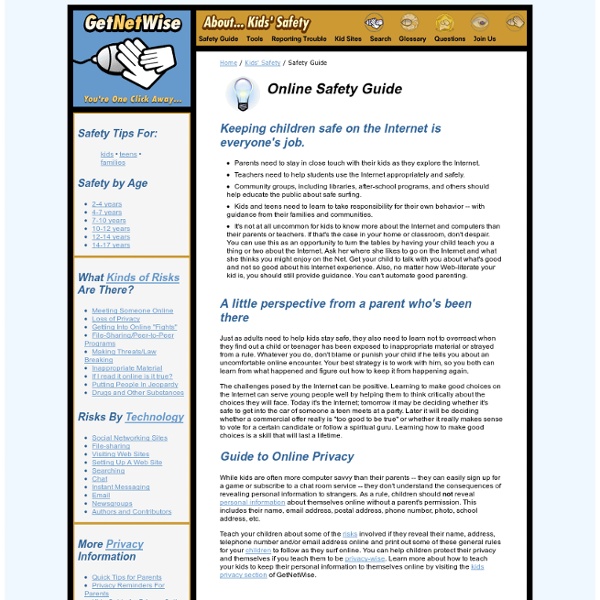Online Safety Guide
Home / Kids' Safety / Safety Guide Keeping children safe on the Internet is everyone's job. Parents need to stay in close touch with their kids as they explore the Internet.Teachers need to help students use the Internet appropriately and safely.Community groups, including libraries, after-school programs, and others should help educate the public about safe surfing.Kids and teens need to learn to take responsibility for their own behavior -- with guidance from their families and communities.It's not at all uncommon for kids to know more about the Internet and computers than their parents or teachers. A little perspective from a parent who's been there Just as adults need to help kids stay safe, they also need to learn not to overreact when they find out a child or teenager has been exposed to inappropriate material or strayed from a rule. The challenges posed by the Internet can be positive. Guide to Online Privacy
Let's Stop Bullying: Advice for Young People
Let's stop Advice for Young People Nobody has the right to hurt other people by hitting them, kicking them, calling them names, spreading rumours about them or by doing anything else which is intended to be upsetting. Bullies try to justify their actions by saying that it is their victim's fault for being different. If this is happening to you tell yourself that it is not your fault, and that it is the bullies who need to change, not you. What To Do Talk to someone you can trust, a teacher, parent, older friend or relative.Be persistent. What Not To Do Don't try to deal with the problem on your own- there is nothing wrong in asking for help.Don't hit the bullies- you might end up being accused of bullying yourselfAlways tell the truth about what has happened. Adult Bullying Bullying is wrong whatever the age of the person who is bullying you. If this is happening at school you can talk to your parents. Working Together You do not have to be a victim to act. Getting Help
Related:
Related:



